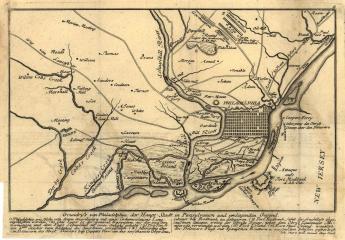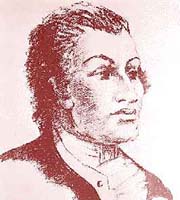Related Topics
Colonial Philadelphia (Pre- 1776)
 It's surprising to most Americans to learn the American Revolution was not the beginning, but almost half-way through the European settlement. And before the Revolution, there were thousands of years of settlement by non-European tribes. We know more about non-European settlers than we did fifty years ago, but records are still very poor or non-existent, and not likely to catch up very rapidly. History will begin in 1492 for a very long time. Long before that, it isn't history, it's anthropology.
It's surprising to most Americans to learn the American Revolution was not the beginning, but almost half-way through the European settlement. And before the Revolution, there were thousands of years of settlement by non-European tribes. We know more about non-European settlers than we did fifty years ago, but records are still very poor or non-existent, and not likely to catch up very rapidly. History will begin in 1492 for a very long time. Long before that, it isn't history, it's anthropology.
Customs, Culture and Traditions
Abundant seafood made it easy to settle here. Agriculture takes longer.
Philadelphia Economics
economics
Revolutionary Philadelphia's Patriots
All kinds of people were patriots in 1776, and many of them were all mixed up about what was going on and how they stood. Hotheads in the London Coffee House stirred up about an inoffensive Tea Act, Scotch-Irish come here to escape the British Crown, the local artisan class and the local smuggler class, unexpectedly prospering under non-importation, and the local gentry -- offended to be denied seats in Parliament like other Englishmen. Pennsylvania wavered until Ben Franklin stepped forward with a plan.
The Jews in Colonial Philadelphia

|
| Haym Salomon |
The word Sephardi is derived from the Hebrew word for Spain, where Jews were a prominent part of the Arab community for several hundred years. The Christian monarchs Ferdinand and Isabella, regarding the Sephardim as pro-Arab, drove them out of Spain and Portugal in 1492. They scattered widely, and only a small portion eventually got to the Western hemisphere. It is also helpful to know that Askenazic is the Hebrew word for German since this other main branch of the religion did not emigrate to America until later in the Nineteenth century in response to the suppression following the 1848 Revolutions. There are some important differences in liturgy, and occasional episodes of bad feeling between the two Jewish groups, some of it kept alive by issues arising in Israel. Historically, the Sephardim have had a greater tendency to assimilate in local cultures, both generally and particularly in Philadelphia. However, the most prominent Jew in the American Revolutionary War was Haym Salomon, who was born in Poland.
On leaving Spain, many Sephardim had gone to Amsterdam, and from there to the Dutch colonies hat accounts for their presence in the Delaware Bay as part of the Dutch settlements which preceded William Penn's arrival. The British conquest of the Dutch accounts for their subsequent local disappearance. However, it paradoxically also accounts for an influx from Curacao and other Caribbean Dutch colonies conquered by the British, usually favoring New York as a place to settle. Presumably, Sephardic feelings about the English were cautious at best. When the British occupied New York in the early days of the American Revolution, many Sephardim fled to Philadelphia, but largely returned to New York after the end of the Revolution. There was thus a double process of filtering out those who were unsympathetic with the British, and those who were attracted by seeing what Philadelphia represented.
Records were poorly kept in those days, and in civil wars, there are often reasons to be vague about your sympathies and activities. We know that Haym Salomon came to Philadelphia in 1774, grew very rich in association with Robert Morris, but died in poverty after a few years, now lying in an unmarked grave. It is a little unclear how he became rich, although all merchants involved in shipping did a little privateering, often described as piracy by the victims. It is also unclear how he became suddenly poor, although speculators in currency and land often make serious misjudgments. Robert Morris is himself a prime example.
The matter becomes of greater interest when Haym Salomon is sometimes referred to as one of the main financiers of the Revolution. Partly because of the ease of counterfeiting with the primitive printing technology of the time, the British had forbidden the use of paper money in the colonies as part of the Townshend Acts. While understandable, it caused great pain to unbalanced trade partners, and metal coins quickly migrated back to England, almost paralyzing colonial economies for lack of cash to transact local business. It probably caused a different sort of a pain to Benjamin Franklin, who derived much of his income from printing the currency of New Jersey. In particular, it kept cargoes trapped in port for lack of payment, which the annoyed British merchants mistook as an implementation of John Dickinson's proposal for deliberate "non-importation". In any event, Jewish merchants and bankers were well situated to find ways around currency blockages, sometimes using precious gems as substitutes for specie, and utilizing informal family networks scattered around the world. In civil wars, guns have to be bought and paid for, legalities get swept aside. There is said to be evidence that our ambassador to France, Benjamin Franklin, utilized Salomon to translate the French loans he had negotiated into the munitions which colonials needed. There is incidentally reason to believe that the Rothschild family established its great wealth by similar commodity dealings at the time of the Battle of Waterloo.
Just what it was that went so drastically wrong for Haym Salomon at the conclusion of our war for independence has not yet been made clear, perhaps never will be. He may have been caught in the uproar over the worthless Continental currency, his ships may have been captured, or he may have been trapped by the land speculation which ruined Robert Morris. But those were rough, tough times. We have the word of those who should know, that Salomon's service was essential to our achievement of Independence.
Originally published: Sunday, October 29, 2006; most-recently modified: Tuesday, April 30, 2019
| Posted by: Rhonda | Dec 26, 2012 12:47 AM |
Cite sources, please.
| Posted by: rabbi simcha freedman | Jun 7, 2009 10:09 AM |